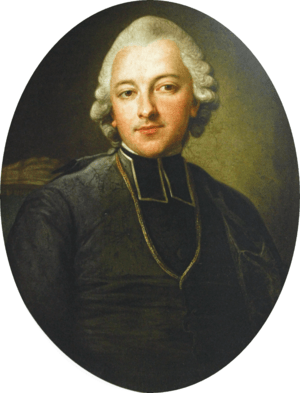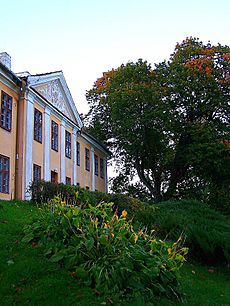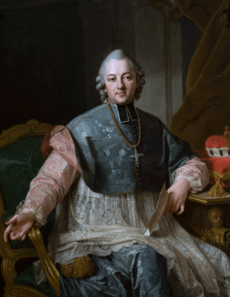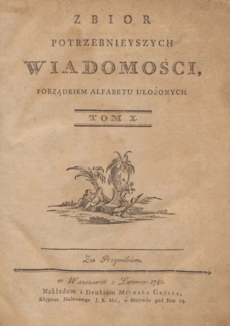Ignacy Krasicki facts for kids
Quick facts for kids His Excellency Ignacy Krasicki |
|
|---|---|
| Archbishop of Gniezno Primate of Poland |
|
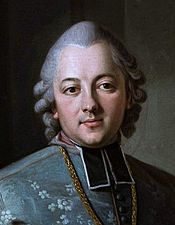
Portrait by Per Krafft the Elder, ca 1768
|
|
| Archdiocese | Gniezno |
| In Office | 1796–1801 |
| Predecessor | Michał Jerzy Poniatowski |
| Successor | Ignacy Raczyński |
| Personal details | |
| Born | 3 February 1735 Dubiecko, Sanok Land |
| Died | 14 March 1801 (aged 66), Berlin |
| Nationality | Polish |
| Denomination | Roman Catholicism |
| Occupation | Writer, Primate of Poland |
| Coat of arms |  |
Ignacy Krasicki (born February 3, 1735 – died March 14, 1801) was a very important Polish writer during the Polish Enlightenment. He was known as "the Prince of Poets." He was also a Prince-Bishop and later the Archbishop of Gniezno, which made him the Primate of Poland.
Krasicki wrote many different kinds of works. He wrote poems, plays, and even the first Polish novel. He was also a journalist and translated books from other languages. His most famous works include his Fables and Parables (1779) and Satires (1779).
Contents
Life of Ignacy Krasicki
Ignacy Krasicki was born in Dubiecko, a town in southern Poland. His family was noble and had the title of Imperial Count. His parents were Jan Boży Krasicki and Anna Starzechowska. Ignacy grew up in a loving family and was related to many important families in the Polish–Lithuanian Commonwealth.
He went to a Jesuit school in Lwów and then studied at a Warsaw Catholic seminary from 1751 to 1754. In 1759, he became a priest and continued his studies in Rome until 1761. Two of his brothers also became priests.
After returning to Poland, Krasicki became a secretary to the Primate of Poland. He became good friends with Stanisław August Poniatowski, who later became the King of Poland. When Poniatowski became king in 1764, Krasicki became his chaplain. He often attended the King's famous "Thursday dinners," where important people discussed ideas. He also helped start the Monitor, a very important newspaper of the Polish Enlightenment.
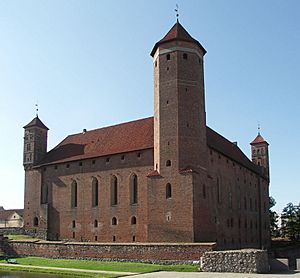
In 1766, Krasicki became the Prince-Bishop of Warmia. This job gave him a high position in society and a sense of freedom. However, it was not always easy. The local church leaders in Warmia were not very welcoming. Also, Prussia started to put pressure on Warmia, planning to take it over. Krasicki spoke out against this outside interference.
In 1772, Warmia became part of Prussia during the First Partition of Poland. This was led by King Frederick II of Prussia, also known as "Frederick the Great." Krasicki became a Prussian subject, but he did not show loyalty to the new Prussian ruler.
He often visited Frederick II in Berlin, Potsdam, and Sanssouci. This was a tricky situation for Krasicki, as he was friends with both the Polish King and the Prussian King. These friendships influenced his writing, especially his Fables and Parables.
Soon after the First Partition, Krasicki helped open Berlin's St. Hedwig's Cathedral in 1773. Frederick II had built this church for Catholic immigrants. In 1786, Krasicki became a member of the Prussian Academy of Sciences. His homes in the castle at Lidzbark Warmiński and the summer palace at Smolajny became places where artists and writers from all over Poland gathered.
After Frederick the Great died, Krasicki continued his relationship with the new Prussian king. In 1795, six years before he died, Krasicki became the Archbishop of Gniezno, which made him the Primate of Poland.
Krasicki received many honors. The Polish King Stanisław August Poniatowski gave him the Order of the White Eagle and the Order of Saint Stanisław. Frederick the Great of Prussia gave him the Order of the Red Eagle.
Ignacy Krasicki died in Berlin in 1801 and was first buried at St. Hedwig's Cathedral. In 1829, his remains were moved to Gniezno Cathedral in Poland.
The writer Czesław Miłosz described Krasicki as a wise person who liked balance and disliked extremes. He was a favorite of both the Polish King Stanisław August and the Prussian King Frederick the Great. Krasicki was very knowledgeable about literature from different countries. He helped make the Polish language clearer and simpler, much like Alexander Pope did for English poetry. He believed literature should teach people about morals and human behavior.
Works of Ignacy Krasicki
Ignacy Krasicki was the most important writer of the Polish Enlightenment. He wrote prose and poetry that his friends admired for its cleverness, imagination, and smooth style. His writings added greatly to the time when King Stanisław August Poniatowski ruled Poland.
Krasicki started his writing career with the famous poem "Święta miłości kochanej ojczyzny" ("O Sacred Love of the Beloved Country") in 1774. This poem was a huge success and later became part of his mock-heroic poem, Myszeida (Mouseiad, 1775). In "O Sacred Love of the Beloved Country," Krasicki wrote about the universal idea of patriotism in a grand style. This poem was even used as a national anthem for many years and was translated into several languages.
Krasicki was excellent at writing in all the popular styles of European classicism. He also created new types of writing. One of his most important new works was the first modern Polish novel, Mikołaja Doświadczyńskiego przypadki (The Adventures of Nicholas Experience, 1776). This novel combined different styles of Enlightenment novels, including social satire, adventure (like Robinson Crusoe), utopian ideas, and teaching lessons.
It is said that Krasicki's mock-heroic poem, Monachomachia (War of the Monks, 1778), was inspired by a talk with Frederick II at the Sanssouci palace. When this poem was published, it caused a public stir.
The most lasting literary works of the Polish Enlightenment are Krasicki's fables: Bajki i Przypowieści (Fables and Parables, 1779) and Bajki nowe (New Fables, published after his death in 1802). He also wrote down his sharp observations about the world and human nature in Satyry (Satires, 1779).
Other works by Krasicki include the novels Pan Podstoli (Lord High Steward, published in three parts, 1778, 1784, and 1803) and Historia (History, 1779). He also wrote the epic poem Wojna chocimska (The Chocim War, 1780), which was about the Khotyn War. He wrote many other works on religious topics and heraldry.
From 1781 to 1783, Krasicki published a two-volume encyclopedia called Zbiór potrzebniejszych wiadomości (A Collection of Essential Information). This was the second general encyclopedia in Polish.
Krasicki also wrote Listy o ogrodach (Letters about Gardens) and articles for the Monitor newspaper, which he helped create. He also had his own newspaper called Co Tydzień (Each Week).
Krasicki translated works by famous writers like Plutarch, Ossian, and parts of Dante's Divine Comedy into Polish. He also translated works by Anacreon, Boileau, Hesiod, and Theocritus. He wrote essays about translating books in 1772 and 1803.
Fame and Influence
Krasicki's most important works became famous across Europe. They were translated into many languages, including Latin, French, German, Italian, Russian, Czech, Croatian, Slovene, and Hungarian. His works remained popular throughout the 19th century.
Many other poets and writers have written about Krasicki. These include Stanisław Trembecki, Franciszek Zabłocki, and Wojciech Mier from the Polish Enlightenment. In the 20th century, Konstanty Ildefons Gałczyński also wrote about him. He was also a character in novels by Wincenty Pol, Adolf Nowaczyński, and Henryk Sienkiewicz.
Literary Messages
Experts believe that Krasicki's Fables and Satires were written to fit the culture of his time and had strong political messages. The characters in his stories were not real people but fictional characters that showed the actual values of society. Krasicki thought that people, especially Poles, were often driven by greed, foolishness, and bad habits.
His preface, "To the Children," was not actually for young children. It was meant for villagers, churchgoers, and common people. The fables were designed to highlight important issues of the day and to encourage social changes. Most of his famous Fables and Parables were published after the First Partition of Poland in 1772. The fables usually had a clear moral lesson at the end, which was easy for everyone to understand, even those who could not read.
Contributions to the Enlightenment
Some historians have not given enough attention to Krasicki's works. However, his influence on his time and the early 19th century is clear. For example, Gabriela Puzynina, a Polish princess and writer, started a newspaper in 1846 that helped spread Krasicki's Fables in Poland's difficult political situation. In her diary, Puzynina highlighted Krasicki's fable "Birds in a Cage" as a comment on the Partitions of Poland.
See also
 In Spanish: Ignacy Krasicki para niños
In Spanish: Ignacy Krasicki para niños
- Fable
- Fables and Parables
- List of Poles
- "O Sacred Love of the Beloved Country"
- Poles
- Polish literature
- Political fiction
- Politics in fiction
- Translation
 | Kyle Baker |
 | Joseph Yoakum |
 | Laura Wheeler Waring |
 | Henry Ossawa Tanner |


